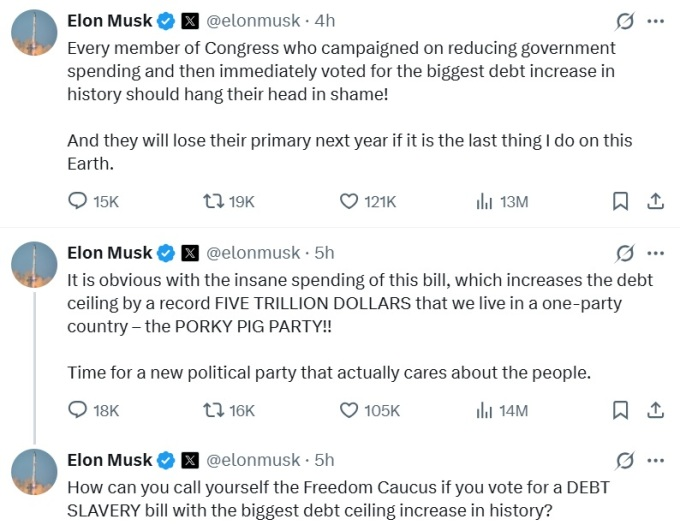Elon Musk, After Leaving the White House, Slams 'Trump Tax Cut Bill': “$5 Trillion Debt Explosion Will Ruin the Country”
Input
Modified
Musk: “The tax bill is insane — I’ll make sure every supporting lawmaker loses” Tax bill passes U.S. Senate 51–50; House vote set for July 2 Mounting concerns over Trump’s tax bill: “Igniting America’s debt bomb”

Source: CEO Musk, X
Tesla CEO Elon Musk harshly criticized former President Donald Trump's tax cut proposal in a series of posts on X, even going so far as to make veiled threats toward lawmakers involved. Musk, who has consistently opposed the bill, appears to have taken a decisive stand. The bill in question encompasses a core segment of Trump’s flagship policies, which Musk argues run counter to the principles of reducing government spending and streamlining fiscal efficiency. His opposition has been a flashpoint in his ongoing conflict with Trump.
Musk Hints at Campaign Against GOP Lawmakers Behind the Bill
On June 30 (local time), Musk posted a string of messages on X (formerly Twitter), once again targeting Trump’s large-scale tax cut bill. “Every lawmaker who voted for this bill should be ashamed,” Musk wrote. “They will lose in the next primary. Even if it’s the last thing I do, I will make it happen.” He also shared an edited movie poster titled “Liar” featuring Pinocchio sitting in a chair, warning that those who supported the bill would find their faces on such posters during the next primaries.
A few hours later, Musk followed up with another post stating, “If this insane bill passes, the ‘America Party’ will be launched the very next day.” He added that the U.S. needs an alternative to the Democratic and Republican duopoly to allow people’s real voices to be heard. Musk had previously floated the idea of founding a party to represent the “moderate 80%” of Americans but had never mentioned a specific timeline until now.
Citing a poll conducted on X, where 80% of respondents agreed that a new party is needed, Musk insisted that a party representing the centrist majority is essential. He ridiculed the current two-party system, saying, “We are effectively living in a one-party state called the ‘Porky Pig Party.’” Musk further warned that the bill would destroy future-oriented industries by subsidizing obsolete sectors, causing the loss of millions of jobs and inflicting immense strategic damage to the country. He specifically criticized provisions that increase taxes on wind and solar projects, arguing that all yet-to-be-constructed renewable energy projects would be subject to heavy taxation. This clause directly affects Musk’s electric vehicle business, including Tesla.
U.S. media reported that Musk invested more than $250 million in support of Trump during last year’s presidential election and has the financial clout to pour significant sums into primaries nationwide via his political action committee (PAC). If his threats materialize, they could create significant turbulence within the Republican Party.

Senate Passes Tax Bill With Vice President’s Tie-Breaking Vote
The large-scale tax cut bill publicly criticized by Musk passed the U.S. Senate on July 1. According to Reuters and other outlets, the bill dubbed the “One Big Beautiful Bill Act” passed with 51 votes in favor and 50 against. Three Republicans defected, leading to a 50–50 tie, which was broken by Vice President J.D. Vance in his capacity as Senate President. Despite holding 53 Senate seats, the GOP faced defections from Senators Thom Tillis (North Carolina), Rand Paul (Kentucky), and Susan Collins (Maine), who had previously signaled their opposition. All 47 Democrats and independents voted against it.
The bill primarily extends major tax cut measures introduced during Trump’s first term in 2017, including reductions in personal income and corporate tax rates, expanded standard deductions, and child tax credits. It also includes provisions like tax exemptions on tips and overtime, and the establishment of $1,000 savings accounts for newborns. On the spending side, the bill expands border security funding to curb illegal immigration. Tax credits for clean energy and electric vehicle purchases introduced under the Biden administration would be repealed or sunset. The bill also raises the federal debt ceiling by $5 trillion to avoid a potential default in August.
After narrowly passing the House last month, the bill underwent numerous revisions in the Senate. On June 28, Democrats demanded a full reading of the 940-page text, triggering lengthy deliberations. A subsequent “vote-a-rama” involved votes on 45 amendments over a 27-hour marathon session. The GOP leadership worked hard to prevent internal defections, with Trump himself applying pressure and threatening primary losses for opponents. The bill, now slightly revised, has been returned to the House for a final vote scheduled for July 2. Republican leaders plan to complete the legislative process, including Trump’s signature, before the July 4 Independence Day holiday.
Trump’s Tax Cuts Could Be Economic Time Bomb
Despite Senate passage, the bill's success in the House remains uncertain due to mounting concerns over its fiscal consequences. The Congressional Budget Office (CBO) projected on June 28 that the bill would add $3.3 trillion to federal debt over the next 10 years. In a report earlier that month, the CBO estimated the bill would increase the deficit by over $2.4 trillion—before factoring in the Senate’s more fiscally expansive revisions, which would widen the deficit by an additional $900 billion. The U.S. national debt currently stands at $36.2 trillion, and the bill is expected to further exacerbate the already dire fiscal situation. The New York Times estimated that once interest costs are included, total debt increase could approach $4 trillion.
Markets are growing anxious that U.S. deficits are reaching a tipping point, potentially undermining trust in U.S. Treasuries, which have long been a pillar of global financial stability. Lazard CEO Peter Orszag warned, “U.S. Treasuries have always been considered the most reliable assets globally, which is why deficit concerns were often dismissed. But this year is different. The federal government is projected to spend more on interest payments than on defense, Medicaid, or Medicare. In other words, interest costs alone will exceed major essential spending categories.”
Orszag also cautioned that while foreign investors have continued to buy Treasuries out of a lack of alternatives, that could soon change. “Shifts in diplomatic relations with major holders of U.S. debt, or increased bond issuance by countries like Germany for defense and infrastructure, could reduce demand for Treasuries,” he said. “Moody’s recent downgrade of U.S. debt is aligned with these structural concerns.”
Indeed, major institutional investors have recently begun divesting from U.S. Treasuries in favor of debt from countries with AAA ratings. According to Bloomberg, insurance firms in Taiwan and Japan, along with pension funds in Australia—formerly heavy buyers of U.S. debt—are now turning to the sovereign bonds of Australia and Singapore. Countries that currently retain top-tier credit ratings from the world’s three major rating agencies include Australia, Singapore, Denmark, Germany, Luxembourg, the Netherlands, Norway, and Switzerland. For large investors seeking to avoid the risks tied to U.S. debt, these alternatives offer compelling options.





















